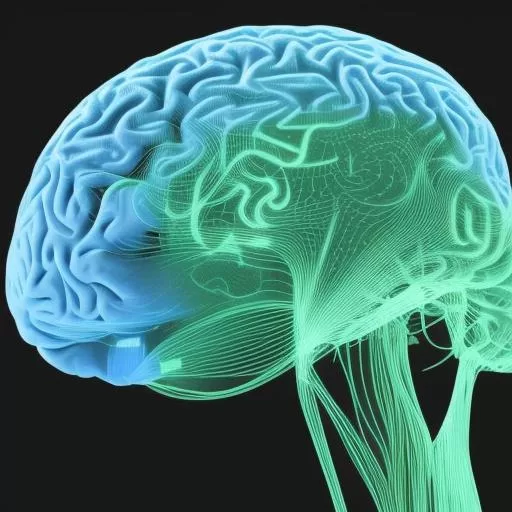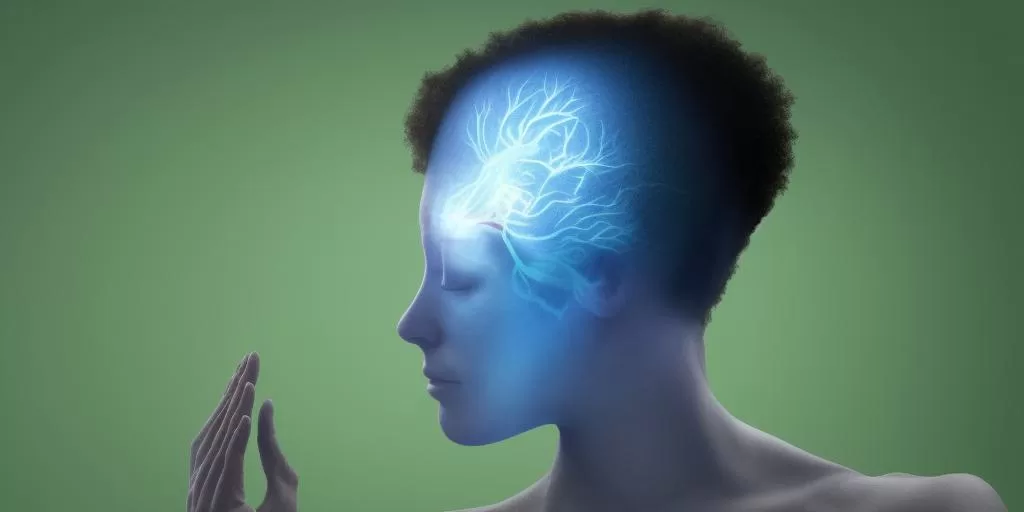The practice of meditation has long been used to improve mental and physical health, but how does it actually affect the brain? Research shows that regular meditation can lead to positive changes in the brain, such as improved cognitive functioning and enhanced ability to manage emotions.
Meditation can stimulate the production of brain waves associated with an increased ability to pay attention, process information more quickly, and improve memory. In fact, studies have shown that those who practice mindful meditation exhibit improved executive functioning when compared to those who did not. Furthermore, people who meditate frequently may develop a stronger connection between regions of the brain responsible for self-regulation and emotional control. In this article, we’ll look into the benefits of meditation on the brain.
In this article, you will learn what happens in the brain during meditation.
Table of Contents
- 1 What is Meditation and Why Practice It?
- 2 Meditation FAQ: How Does Meditation Work?
- 2.1 What Effects Does Meditation Have on the Brain?
- 2.2 Are There Any Negative Effects of Meditation on the Brain?
- 2.3 Can Meditation Cause Brain Damage?
- 2.4 Can Meditation Cause Mental Illness?
- 2.5 How Meditation Affects the Subconscious Mind?
- 2.6 How Different Types of Meditation Affect the Brain?
- 2.7 Can Meditation Help Brain Damage?
- 3 Understanding the Power of Meditation
- 4 Meditation’s Effects on the Brain
- 4.1 Meditation State and Brain Activity
- 4.2 What Is the Effect of OM Chanting on the Brain?
- 4.3 Meditation: Cognitive Benefits
- 4.4 Left Hippocampus
- 4.5 Posterior Cingulate Cortex (PCC)
- 4.6 Pons
- 4.7 Anterior Cingulate Cortex (ACC)
- 4.8 The Temporoparietal Junction (TPJ)
- 4.9 Medial Prefrontal Cortex
- 4.10 Dorsal Anterior Cingulate Cortex (dACC)
- 4.11 Longitudinal Effects of Meditation on Brain Resting-State Functional Connectivity
- 4.12 Effects of Prayer and Meditation on Neurobiology
- 4.13 Which Meditation is Good for the Brain?
- 5 Meditation and Health
- 6 Meditation, Clear Mind, and Mindfulness
- 7 Play the Long Game: Aging and Brain
- 8 Brain Structures and Neuroplasticity
- 9 What Are Meditation’s Effects on the Brainwaves?
- 10 How to Practice Meditation?
- 11 Conclusion: Meditation Should Be an Ongoing Practice, Not a Magic Pill
What is Meditation and Why Practice It?
Meditation is an ancient practice often used to improve mental and physical health. While the specific reasons behind its effectiveness are not fully understood, research suggests that it is due to changes in the brain regions involved in attention, emotion, and self-awareness. Mindfulness meditation training has been reported to be associated with greater gray matter density within certain brain regions such as the left hippocampus, posterior cingulate cortex, temporoparietal junction, and cerebellum. These areas of higher density suggest that mindfulness meditation can help individuals focus on their own thoughts and feelings better than before they began meditating.
Does meditation affect the brain?
Absolutely! Mindfulness meditation’s effects on the brain are that you become more self-aware of what you are thinking and how are you reacting. The impact of meditation on the brain is largely positive as it allows for many cognitive-enhancing changes to take place.
During meditation, one practices self-reflection and pays attention to their body and mind. When meditating, the goal is to achieve a state of deep relaxation and focus in order to reduce stress, cultivate concentration, and increase mindfulness. People who meditate on a regular basis often report feeling better in both their physical and mental health as well as improved cognitive functioning.
Continue reading to find out what are the effects of meditation on the brain.
Meditation FAQ: How Does Meditation Work?

Meditation can help you achieve a number of benefits, including reducing stress, managing anxiety, improving focus and attention, enhancing sleep, and improving self-image. To get the most out of meditation, find a quiet place with few distractions and relax in a comfortable position. Close your eyes, focus on your breathing and allow thoughts to come and go without judgment. When you notice your attention wandering, bring it back to your breath.
What Effects Does Meditation Have on the Brain?
Research has shown that changes in the brain’s structure and function occur when meditating. These changes are believed to be responsible for the many benefits of meditation. Neuroimaging studies have found increased activity in areas of the brain associated with attention, self-regulation, and emotional control. Additionally, research has found that regular meditation can lead to an increase in gray matter density within certain brain regions. This suggests that meditation can help individuals better regulate their emotions and become more aware of themselves and their surroundings.
Are There Any Negative Effects of Meditation on the Brain?
Sometimes, meditation may cause anxiety, depression, stress, and hallucinations although this usually only happens when an unprepared person starts using advanced meditation techniques without fundamental knowledge. Generally, meditation is safe and if one experiences any negativity while meditating, it is because it was already there. In this case, visiting a therapist would be a smart move.
Can Meditation Cause Brain Damage?
This is highly unlikely. Currently, there is no evidence that common meditation techniques can cause any brain damage. Typically, research confirms that meditation’s effects on brain chemistry are rather positive.
Can Meditation Cause Mental Illness?
Generally speaking, there are no known risks associated with engaging in regular meditation; however, it is important to note that it could be detrimental if done improperly or by someone who has pre-existing mental issues.
Meditation can actually be harmful to those with pre-existing mental conditions. Without proper guidance from an experienced teacher, individuals who already suffer from a mental disorder may find themselves in a worse state than before they began meditating.
To understand why this is the case, one must first understand the effects of meditation on an individual’s brain chemistry and physiology. For people with existing mental health issues such as anxiety or depression, unsupervised and ill-practiced meditation can lead to feelings of overstimulation and discomfort due to changes in their neural pathways caused by their practice.
How Meditation Affects the Subconscious Mind?
The effects of meditation on the subconscious are believed to be due to its ability to decrease stress levels in practitioners, thus allowing them greater access to repressed thoughts and emotions. It may also aid in consolidating memories while improving pre-existing neural networks associated with various psychological functions such as focus, creativity, or emotion regulation. These findings suggest that meditation not only helps people develop greater insight into themselves but can also open up pathways within their minds toward long-term positive change.
How Different Types of Meditation Affect the Brain?
There are many different types of meditation each with their own distinct qualities and effects on the brain. Mindfulness-based meditation is one of the most popular practices in modern times. This type of meditation focuses on being present in the moment by focusing on sensations, feelings, and thoughts without judgment or reaction. Research has shown that mindfulness-based meditations can reduce stress hormones and increase activity in areas related to self-awareness, compassion, and introspection. Transcendental Meditation Technique is another type of meditation that involves repeating mantras silently or aloud depending on the individual’s preference. Studies have found this practice can help decrease symptoms of depression and anxiety by increasing blood flow to areas associated with creativity, learning, and memory formation. However, bear in mind that real transcendental meditation is not the same as the commercial “Transcendental Meditation Technique”.
Can Meditation Help Brain Damage?
There is still much to learn about the potential benefits of meditation for those with TBI (Traumatic Brain Injury), but recent studies suggest that it can have a positive impact on both mental and physical health. However, more research is needed to fully understand the effects of meditation on those with TBI and its potential to improve their quality of life.
It’s too early to say if meditation heals brain damage but we do know it does help in certain conditions. The neurological effects of meditation and healing are yet to be fully researched.
Understanding the Power of Meditation

The power of meditation is one that cannot be overstated. By taking the time to practice this ancient tradition, we can gain a greater understanding of ourselves and our inner workings. It has been shown to reduce stress, increase physical health, and aid in mental clarity. Through meditating, we are able to take a step back from life’s everyday distractions and focus on our own thoughts, feelings, and emotions. This challenge can be difficult for many people as it requires discipline and dedication, however, if practiced consistently, its benefits are immense.
There are many different types of meditation – guided visualization, mantra recitation, or mindfulness – which provide different ways of calming the mind while still allowing yourself to become deeply aware of your internal state.
Does Meditation Really Change the Brain?
Research has shown that regular meditation practice can regulate activity between these two networks, with relaxation techniques helping to reduce overactivity in the DMN while promoting far more efficient functioning of the DAN. When both of these networks are optimized through mindfulness practices their efficiencies compound leading to enhanced psychological states such as improved memory formation and emotion regulation.
Does Meditation Increase Brain Cells?
The evidence is clear: meditation increases brain cells by increasing gray matter volume in areas associated with learning, memory formation, emotional regulation, and sense of self. This increase in gray matter is particularly noticeable when individuals take up a long-term meditation practice. Long-term meditators also show increased grey matter density compared to non-meditators in areas such as the hippocampus and prefrontal cortex which are both associated with learning and decision-making processes.
All in all, to practice meditation means to actively work on your brain and alter its structure in a way allowing it to become smarter, more resilient, and better adapted to the environment. Studies have demonstrated the positive effects of regular meditation practice on a neurological level, particularly influencing the Default Mode Network (DMN) and Dorsal Attention Network (DAN). The DMN is responsible for activities such as self-reflection, daydreaming, and rumination while the DAN is involved in task-oriented activities like focus and concentration.
Mindfulness’ Effects on the Brain
Mindfulness has become an increasingly popular practice in recent years. It is known to influence physical, mental, and emotional health through its calming effects on the brain. Through mindfulness, people are able to reduce the amount of stress they experience throughout the day and improve their mental clarity.
Mindfulness is a type of meditation that has been studied extensively lately. The effects it has on the brain have been largely positive. Through this practice, individuals become more aware of their thoughts and emotions, as well as those around them. This greater awareness can lead to improved self-regulation and focus. Studies have also shown that mindfulness can help to reduce negative thinking patterns, increase mental well-being and improve physical health too. Its effects on the brain are multifaceted; mindfulness increases activity in areas related to attention control and emotion regulation whilst reducing activity in areas associated with stress responses such as fear or anxiety.
Meditation’s Effects on the Brain

If you want to learn how to use meditation to clear your mind, you first have to acknowledge the effects of long-term meditation on your mind and your brain.
What are the effects of meditation on the brain?
The effects of meditation on the brain are invaluable. It makes you smarter, calmer, more in control, and most importantly, allows you to tune in with your mind and body.
Meditation is a great way to improve your mental health. It has been proven to have measurable effects on the gray matter volume, prefrontal cortex, and amygdala in your brain. These areas are responsible for important mental functions such as memory, decision-making, and emotional response. Meditation can help you improve your overall mental health and well-being.
To put it simply, meditation’s effect on the amygdala is that it shrinks resulting in a less stressful life.
Meditation’s effects on brain cells can be astonishing. Meditation affects the brain in various ways, such as activating regions that control attention and reducing activity in areas related to fear and anxiety. Practicing meditation increases levels of positive neurotransmitters like dopamine, serotonin, oxytocin, and endorphins which help improve mood, cognition, and decision-making abilities. Studies suggest that meditating can also increase resiliency to stress, allowing us to more effectively cope with difficult emotions.
Carry on reading to find out how meditation affects your brain in more detail.
Neurons connect and form neural pathways when you repeatedly do an activity, which in turn helps to strengthen the neurons and their connections. For example, if you are a cab driver who navigates different routes often, then the neural pathways that develop for spatial reasoning will be strengthened. This same process happens when you meditate – while research on mindfulness meditation is still in its early stages, some studies have found that over time mindfulness may lead to increases in gray matter density in certain brain regions, such as the hippocampus and frontal lobes. Increases in gray matter and the left hippocampus help with learning, cognition, and memory resulting in better retention of facts and more mindful behavior.
Meditation and its effects on the brain are described in detail below.
Meditation State and Brain Activity
Meditation has been found to have a beneficial effect on brain activity. Research suggests that meditation can lead to an increase in alpha-wave activity, which is associated with relaxation and heightened concentration. Alpha waves are linked to the pre-frontal cortex, which is responsible for higher cognitive tasks such as decision-making, problem-solving skills, and memory recall. Studies have also found that people who meditate on a regular basis experience more balanced levels of gamma waves. Gamma waves are associated with mindfulness and self-awareness, two qualities that are essential for emotional regulation.
Overall, it appears that meditation can positively affect activity in various areas of the brain, leading to enhanced mental clarity and well-being. Those who practice meditation report experiencing improved focus, increased creativity, and better overall moods than those who do not meditate.
Please note that although meditation might seem like a simple task, it requires discipline and regular practice to positively affect brain cell volume. Adapting to the new environment takes time and the latest neuroscience research confirms that long-lasting changes in the brain do not appear overnight but rather with weeks and months of regular practice.
Read further to find out what parts of the brain are affected by meditation and what are the physical effects of meditation on the brain.
What Is the Effect of OM Chanting on the Brain?
Chanting OM helps induce a sense of relaxation, changes in autonomic balance, and deactivation of limbic brain regions. The first fMRI connectivity study of OM chanting found that the brain’s response was significantly reduced in areas involved in emotion processing, such as the insula and anterior cingulate cortex. The finding raises the possibility that OM chanting may be a potential therapeutic tool for treating depression, as those areas are known to be heavily impacted by MDD (Major Depressive Disorder). Further studies need to examine the role of OM meditation in patients with MDD.
To sum up, meditation is a powerful tool that can help improve cognitive functioning and reduce stress levels. By regularly practicing mindfulness meditation, individuals can gain greater insight into their own thoughts and feelings, as well as improved emotion regulation. Thus, if you’re looking to achieve a clear mind and reap the many benefits of meditation, give it a try today!
Meditation: Cognitive Benefits
Meditation has been found to be a reliable cognitive enhancer in recent studies. Meditation’s effects on the mind are improved attention, memory, and problem-solving skills. In addition, meditation has been shown to reduce stress levels and promote overall well-being. It is postulated that meditation affects the brain’s plasticity; that is, it encourages the growth of new neural connections as well as strengthening existing ones. The neural mechanisms underlying this are thought to be related to neurogenesis (the creation of new neurons) as well as increased activity of neurotransmitters such as dopamine and serotonin. As an example of how this works, one study found greater increases in gray matter density in areas associated with attention span after eight weeks of mindful meditation training compared to controls who were not receiving any type of training. This suggests that meditation can indeed enhance cognitive abilities by improving structural changes within the brain.
Can meditation increase brain power?
To sum it up, meditation is a useful tool for cognitive enhancement. Meditation can be practiced for a cognitive function boost. Below is a list of the positive effects of meditation on the brain.
Left Hippocampus
Meditation has been shown to grow the cortical thickness of the hippocampus, which in turn helps increase gray-matter density and promote all of the important functions that go along with a healthy brain. Recent functional magnetic resonance imaging (fMRI) studies have identified a unique correlation between the practice of meditation and activation in the left hippocampus. The left hippocampus is important for learning, memory formation, and emotional regulation. This suggests that through regular meditation one may be able to increase memory recall and improve emotional health by activating this brain region.
Posterior Cingulate Cortex (PCC)
With the help of functional magnetic resonance imaging (fMRI), scientists have studied how meditation influences brain activity, focusing on one particular region – the posterior cingulate cortex (PCC). This research has been able to identify that this part of the brain experiences increased activation when individuals are meditating. The PCC is located in the medial prefrontal cortex and plays a role in self-referential processing and introspection. By looking at fMRI scans of participants before and during meditation, researchers were able to observe an increase in neural activity within this area when they were meditating as compared to their resting state. This suggests that it might be associated with self-regulation or introspection during meditation.
Pons
The pons is an important part of the brain in regards to neurotransmitter production and keeping our brains functioning at their best. Neurotransmitters like serotonin, dopamine, and norepinephrine are all produced in the pons, which helps regulate crucial bodily processes like digestion and sleep. These neurotransmitters can also help us maintain a state of mental clarity that allows us to reach peak performance both mentally and physically. Meditation is one way that we can actively work toward strengthening our pons’ ability to keep our brain activity regulated. It has been found that consistent meditation practice can lead to increased levels of dopamine, serotonin, and norepinephrine throughout the body as well as improved cognitive function overall.
Anterior Cingulate Cortex (ACC)
The ACC is responsible for allowing us to regulate our emotions and behaviors, as well as perform complex tasks. Moreover, recent studies have found that regular meditation training can increase gray matter density in this area of the brain. This suggests that meditation may serve an important role in helping individuals develop better cognitive functioning, emotional regulation skills, and overall well-being.
The ACC plays a critical role in enabling us to attend to certain stimuli while filtering out distractions. For example, through its integration with other parts of the brain, it enables us to pay close attention when necessary while simultaneously ignoring irrelevant information or stimuli.
The Temporoparietal Junction (TPJ)
Meditation is a practice that has been used since antiquity to reduce stress, increase concentration and awareness, and promote relaxation. It has also been found to have an effect on the brain’s temporoparietal junction (TPJ), located in the parietal lobe of the brain. The TPJ is responsible for processing sensory input from our surroundings, such as sound and touch, as well as providing us with self-reflection and empathy. Studies into meditation practices have shown that even short periods of meditative practice can alter activity in this part of the brain significantly.
Medial Prefrontal Cortex
The effects of meditation and its potential benefits have been studied extensively in recent decades. One area of research examines how the practice can affect the medial prefrontal cortex, an area of the brain associated with emotion regulation, self-referencing, and empathy.
Studies have shown that regular meditation can bring changes in the size and structure of this part of the brain. For example, one study found that regular meditators had more gray matter volume in their medial prefrontal cortex than those who did not meditate.
Dorsal Anterior Cingulate Cortex (dACC)
The dorsal anterior cingulate cortex (dACC) is a key component of the brain’s executive systems, which are responsible for higher-level cognitive functions such as decision-making, inhibitory control, and emotion regulation. It has been established that meditation activates the dACC, resulting in reduced levels of spontaneous emotional reactivity and increased emotional stability. This highlights the potential of this form of contemplative practice for modulating affective states and enhancing one’s capacity to manage difficult emotions.
Longitudinal Effects of Meditation on Brain Resting-State Functional Connectivity
Meditating has a lot of positive long-term effects on the brain, both physically and mentally. It can lead to improved concentration and focus which allows for better decision-making and problem-solving. Additionally, it can help manage stress levels which increases alertness, creativity, and overall productivity.
On the physical level, meditating regularly has been shown to increase gray matter density in areas of the brain associated with learning, memory formation, and processing emotions which is correlated with higher levels of self-awareness as well as emotional stability due to decreased activity in the amygdala – an area responsible for fear responses. Furthermore, meditation appears to strengthen neuron connections throughout various parts of the brain leading to improved communication between different areas which results in enhanced cognitive flexibility – one’s ability to switch from task to task without getting overwhelmed or distracted by external influences.
Upon recruiting ten novice meditators from a university meditation course, it has been found that FAM (Focused Attention Meditation) can enhance the brain’s connectivity, especially among and within brain networks. This suggests that FAM may have a positive impact on fast switching between mind wandering and focused attention, as well as maintaining attention once in the attentive state.
Effects of Prayer and Meditation on Neurobiology
Prayer and meditation have been used for centuries as a means of stress relief and relaxation. Recently, neurobiological research has revealed that these practices can have powerful effects on the brain that extend beyond mental health. Specifically, prayer and meditation can activate neural pathways in the brain and stimulate physical changes in tissue structure associated with improved mental well-being.
Scientists indicate that prayer and meditation alter neural connections in the brain associated with emotion regulation, cognitive processes, language development, and interactions with other individuals. Additionally, regular practice of these activities is linked to an increase in gray matter volume throughout areas of the brain responsible for attention control, self-referential processing, emotional regulation, and perspective-taking. This suggests that prayer and meditation may rewire our brains over time by strengthening neuronal connections within regions related to higher-level functions such as empathy or increased concentration.
In summary, praying and meditating both have the potential to affect the brain in powerful ways. Furthermore, research suggests that both practices have similar effects on attentional control. Praying or meditating can help individuals better regulate their emotions and thoughts by increasing their capacity for focus and concentration.
Which Meditation is Good for the Brain?
Prayer is a form of contemplation that involves speaking directly to another higher power. This type of meditation allows people to gain insight into their feelings, beliefs, and hopes while deepening their faith and understanding. Mindfulness encourages individuals to observe their thoughts without judgment or attachment with attention placed on staying in the present moment. It may also help improve focus by allowing one to recognize distractions and return back to inner stillness. Zen meditation is a Buddhist form of meditation that focuses on cultivating mindfulness and awareness. It emphasizes having an open mind and allowing thoughts to come and go without judgment or attachment. The main purpose of Zen meditation is to bring the practitioner into a state of consciousness in which they observe their own thoughts, feelings, and sensations. Zen meditators practice paying attention to the breath, allowing their minds to remain in the present moment instead of dwelling on past events or imagining future scenarios. Mindfulness meditation is similar to Zen meditation in that it also focuses on being present in the moment, but with more emphasis placed on observing one’s thoughts and emotions as an impartial third-party observer.
All forms of meditation can bring positive benefits to the brain when done correctly and consistently. Whether it is prayer, mindfulness, Zen meditation, or transcendental meditation; each type of practice can have its own unique purpose and benefit the brain in different ways.
Meditation and Health
Meditation is a great way to improve your health. When you meditate, you relax your body and mind and let go of any worries or troubles that might be bothering you. This helps lower stress, which can make us feel better physically and mentally.
Meditation also helps us focus our energy on the things we enjoy doing rather than what’s stressing us out. We can choose to think about our happy memories from the past or dream about all the amazing things we’d like to do in the future. Doing this fills our minds with positive thoughts which can lift our spirits and help us stay healthy both inside and out!
National Institute of Mental Health on Meditation
The National Institute of Mental Health (NIMH) is a branch of the United States government that focuses on mental health. It has conducted significant research into meditation and its benefits for mental health. One such study found that when individuals practice mindfulness meditation, their capacity to pay attention, remember details, and retain information increases significantly. Additionally, the study revealed that mindfulness meditation can reduce stress levels and improve the quality of sleep among meditators.
More recently, NIMH has released studies linking yoga-based practices to improved physical and psychological well-being. The study found that participants who practiced yoga experienced less fatigue as well as fewer depressive symptoms compared to those who did not participate in any form of physical exercise or relaxation activity during the course of the study.
Meditation and Blood Pressure Medication
Meditation has been used to manage physical and mental health symptoms for centuries. In recent years, it has been studied more intensely as a way of helping those with hypertension, or high blood pressure. Many researchers have found that meditation can reduce the need for blood pressure medication in some individuals by aiding the body’s natural ability to regulate its own processes.
Meditation has been proven to be an effective way to reduce high blood pressure and thereby help people avoid the need for medication. For example, in a study involving elderly adults with hypertension, meditation was shown to provide a substantial improvement in blood pressure levels.
The effectiveness of meditation in reducing high blood pressure is due to its ability to help the body relax and improve one’s response to stress.
Meditation, Clear Mind, and Mindfulness

Meditation is one of the most powerful tools for developing a clear mind. It is a practice that helps to reduce stress, sharpen concentration, and promote feelings of peace and well-being. Mindfulness meditation, in particular, enables us to cultivate an awareness of our thoughts and emotions without judgment or attachment. Through careful observation of our mental processes, we can learn to recognize when our thinking becomes clouded by unhealthy anxieties or negative self-talk. This insight can help us break free from the cycle of rumination and reorient ourselves toward more productive activities.
Mindfulness meditation also helps us cultivate equanimity; a nonjudgmental attitude toward all experiences – pleasant or unpleasant – which engenders greater self-acceptance as well as acceptance for others.
One of the most important things we can do for ourselves is to cultivate a calm mind. The benefits that come from having a calm mind are numerous and far-reaching. To begin with, it reduces stress levels, as one does not allow themselves to get overwhelmed by life’s challenges or difficulties.
When one’s mind is in a state of rest, they can be better able to focus on tasks at hand, allowing them to be more productive and efficient in their work or endeavors. Additionally, they tend to think more clearly when they are more relaxed. This allows them to make better decisions and opens up possibilities that might otherwise have been missed if they were too anxious or fatigued mentally. Furthermore, when an individual has achieved peace within themselves mentally and emotionally, this inner tranquility reflects outwardly in their behavior and attitude toward others.
In summary, with meditation regular practice, you can cultivate a more compassionate neurobiology that:
- Contributes to a greater sense of well-being
- Helps to maintain brain health as you age
- Aids in alleviating mental stress
- Promotes healthy, sustained focus, and empathy
Mindfulness Meditation for Clear Mind and Improved Quality of Sleep
Meditation can also help reduce stress levels and improve the quality of sleep among meditators. Research has suggested that regular meditation practice is associated with deeper, more restorative sleep and improved mood. In one study, participants who practiced mindfulness meditation for eight weeks reported improvements in their overall sleep quality, including better sleep latency (the amount of time it takes to fall asleep) and fewer awakenings during the night and although it still suggests that further, more detailed research is necessary, it looks promising.
Moreover, mindful meditation has been linked to a greater awareness of how our thoughts, emotions, and behaviors influence our mental and physical health. This increased self-awareness can lead to healthier lifestyle choices, such as going to bed earlier, exercising regularly, and eating nutritious foods. By cultivating a healthy relationship with ourselves and our environment, we can achieve greater balance and resilience in the face of life’s stresses and demands.
Use Mindfulness to Manage Your Mood and Well-Being
Mindfulness and meditation can help reduce the period of time before the relapse of episodes of low mood. A study found that mindfulness-based therapy over a 56-week period significantly reduced the number of times an individual needed to relapse into a low mood. It also improved short-term and long-term maintenance of healthy moods. The study participants also reported an improvement in their quality of life.
Meditation Calms Down Your Sympathetic Nervous System
When you practice mindfulness meditation, you’ll find that your sympathetic nervous system gradually starts to decrease in activity. This means that you won’t be as prone to releasing stress hormones in the face of danger, letting you stay calm and collected instead. Deactivating your sympathetic nervous system allows you to relax and rest. By meditating, you are essentially turning on the parasympathetic branch of your nervous system, which is crucial for overall health.
Meditation can also help reduce pain, depression, stress, and anxiety. In addition, the calming effect of meditation on the sympathetic nervous system is invaluable. This can decrease emotional reactivity and help you feel more relaxed and at ease.
Meditation Improves Focus and Memory
Default mode networks of neurons are deeply implicated in mind wandering or the “monkey mind.” But scientists have found that disturbances in these networks can lead to anxiety, depression, attention disorders, and post-traumatic stress disorder.
If you’re looking to boost your happiness levels, meditation may be the perfect solution. By focusing your attention on the present, you can reduce stress and enjoy more positive moments. It’s a great way to de-clutter your mind and make room for peace of mind.
Meditation can help you to stay focused and attentive, which may reduce your tendency to mind wander and excessive focus on self-referential thoughts.
Play the Long Game: Aging and Brain

In one study, scientists compared the brain scans of 50 long-term meditators with the scans of those who didn’t meditate. They found that long-term meditation practice has a noticeable impact on the brain, specifically in terms of enhancing cognitive function and reducing stress.
Not only did those who meditated experience a less severe decline in gray matter as they aged, but the loss was actually reversed for some participants. Whether or not this is due to the mental and physical benefits of meditation is still unknown, but it’s an intriguing finding nonetheless.
Researchers say that more research is needed to confirm the effects of meditation on the aging of the brain. However, preliminary evidence suggests that meditation may have a positive impact on cognitive function and overall well-being in older adults.
Meditation has also been shown to increase the strength of higher-order brain functions while decreasing lower-order activities. This is a testament to the incredible power of meditation in changing our lives for the better.
By using meditation, you can help train your brain and improve your overall well-being. This practice has been shown to be helpful in improving concentration, focus, and stress relief.
Brain Structures and Neuroplasticity
In a study published in the journal Psychiatry Research, researchers found that 8 weeks of the Mindfulness-Based Stress Reduction (MBSR) training program increased the cortical thickness (gray matter concentration) of the hippocampus – which is responsible for memory and regulating emotions.
Another study also found that the volume of the amygdala (the part of the brain responsible for emotions such as stress, fear, and anxiety) is smaller in people who meditate. This could be indicative of a decrease in emotional responses to stressful situations, which could lead to improved mental health overall.
Recent studies have revealed that the shape of our brains can be altered in as little as eight weeks. Such findings are remarkable and indicate how resilient, yet malleable, the human brain is. This research has shown that regular mental stimulation can lead to an increase in gray matter volume. Gray matter is a collection of neurons within the brain responsible for processing sensory information, formulating ideas, and controlling key functions such as movement.
The implications of the studies are far-reaching and warrant further exploration. If it only takes two months to change the shape of our brains, then intentional activities such as meditation or learning a new language could result in improved cognitive functioning at an accelerated rate. It also suggests that certain behavior or lifestyle factors may influence neurological development over time if done often enough.
How Meditation Changes the Brain
Depression is a serious psychological disorder that has a significant impact on both individuals and society. Therefore, it is important to understand how depression affects the brain and what methods can be taken to help reduce its effects. In recent years, researchers have been focusing on ways in which depression alters the brain itself.
Studies suggest that certain areas of the brain, primarily those related to emotional regulation, are negatively impacted by depression. Specifically, areas such as the prefrontal cortex and amygdala tend to show signs of decreased activity when someone is depressed compared to someone who is not suffering from this condition. Additionally, increased levels of stress hormones such as cortisol may also play a role in altering these regions of the brain over time.
Furthermore, additional research suggests that there may be an association between changes in these specific parts of the brain and symptoms related to depression including sadness, fatigue, and insomnia.
Release Chemical Helpers with Meditation
Mindfulness has been shown to have a measurable impact on brain chemicals that can help regulate mood and reduce stress. Cortisol levels are decreased, which helps relieve stress, and DHEA levels are boosted, which promotes longevity. GABA is also improved, leading to a calming effect in the CNS. Endorphins are increased, causing a “natural high” and growth hormone levels are elevated, helping keep you youthful. Melatonin is boosted, promoting restful sleep and also helping with mood regulation.
What Are Meditation’s Effects on the Brainwaves?

Meditation has been proven to have many benefits for the mind and body. One of these advantages is its effect on the brainwaves of those who practice it regularly. Brainwave activity is an important indicator of overall mental health, and meditation can help to improve this.
Does meditation change the brainwaves?
Meditation affects the brain in many ways. Studies show that meditation can lead to increased levels of alpha and gamma waves in the brain. Alpha waves correspond with relaxation and creativity, so regular meditators tend to experience feelings of calmness and clear thinking more easily than non-mediators. Gamma waves are associated with higher cognitive processes such as attention span and problem-solving capabilities. Meditating also helps individuals to think more clearly when facing complex tasks or decisions.
Main Types of Brain Frequencies
Brainwave frequencies are electrical signals generated in the brain that can be measured by an electroencephalogram (EEG). The EEG detects and records the electrical activity occurring within different parts of the brain, which is expressed as a frequency. These frequencies, measured in hertz (Hz), correspond to different states of consciousness, mental activities, and emotions.
Alpha Brainwaves
Alpha brainwaves range between 8-12 Hz and are a type of brainwave that is present when one’s mind is in a relaxed and alert state. Alpha waves have been found to have several beneficial effects on mental well-being, such as reducing anxiety levels, improving focus and concentration, and enhancing problem-solving skills. For these reasons, it has become increasingly popular for people to try to induce alpha brainwaves through various relaxation techniques. The most common way to induce alpha waves is through meditation or mindfulness practices. These methods involve focusing the mind on an object or activity in order to increase the production of alpha waves by reducing the amount of neural activity. Additionally, some people find that listening to music can also help them reach this relaxed yet alert state of mind; certain types of music are thought to be particularly effective at aiding this process.
Beta Brainwaves
Beta brainwaves have a range of 12.5-30 Hz and are an important part of a healthy mind, as they represent the frequency associated with high levels of mental activity. It is generally accepted that individuals in beta brainwave states experience heightened alertness and focus, which can help them better process information, interpret events, and make decisions. However, too much activity in this spectrum can lead to stress and overstimulation. To maintain a balanced level of beta brainwaves and ensure optimal cognitive performance it is important to establish healthy coping strategies such as regular exercise or yoga practice. Proper sleep also plays an essential role in regulating one’s level of beta-wave activity. Sleep deprivation has been associated with lower levels of these waves; conversely adequate rest can improve their production. Additional strategies for improving mental clarity include consuming nutritious foods and participating in activities that promote relaxation such as meditation or mindfulness practices.
Gamma Brainwaves
Gamma brainwaves are electrical pulses that occur at a frequency of 25 to 100 Hz. They are the fastest type of brainwave, and as such can be difficult to measure in the lab. Gamma waves have been linked to cognitive processing, learning, and higher states of consciousness. For example, gamma waves have been associated with enhanced mental focus and attention during meditation or intense sensory experiences. Additionally, research suggests that increased levels of gamma activity may play a role in improving memory recall and retrieving stored memories from long-term storage sites in the brain. Studies suggest that when we increase our level of gamma activity it increases our ability to think clearly and make informed decisions more quickly. It has also been suggested that this phenomenon may be associated with improved mental health outcomes including a reduction in anxiety symptoms and other psychological disorders related to stress or traumatic events.
Delta Brainwaves
Delta brainwaves are a type of frequency in the range between 0.5 and 4 Hertz (Hz). It is the slowest and deepest type of brainwave, associated with deep sleep, meditation, and trance states. Physiologically speaking, delta waves are generated when neurons oscillate at a rate slower than 4 Hz; this state is known as synchronization. During delta wave cycles, large parts of the brain synchronize their neural activity in order to maintain its fundamental functions such as respiration and circulation while keeping other areas inactive. The presence of delta waves has been documented by EEG analysis during certain stages of sleep. Delta waves also appear during hypnosis or meditation, providing insight into its therapeutic value.
Theta Brainwaves
Theta brainwaves are a type of brainwave that occurs during deep relaxation and meditation. Their range is 4-8 Hz. These types of brainwave frequencies are associated with the state just prior to sleep and dreaming, providing a sense of calmness and serenity. In this state, one can experience a heightened level of creativity, insight into subconscious thoughts or feelings, and the ability to access higher spiritual awareness. Meditation is an effective way to achieve theta wave states as it involves shifting our mental focus away from everyday worries and concerns, allowing us to be in a more relaxed frame of mind. This shift also helps us to become better listeners, both internally (listening to ourselves) and externally (listening closely to others in conversation). Theta states can also help reduce stress levels while increasing emotional well-being.
How to Practice Meditation?
Practicing meditation can be a lengthy process that requires discipline, patience, and dedication. There are many different ways to approach meditation, but the following steps will help those new to meditation get started.
The first step in practicing meditation is to create a comfortable environment where there are no distractions or interruptions. This may involve turning off phones and computers, dimming lights, or playing soothing music. Once you have established a peaceful atmosphere it is important to sit comfortably with your back straight and your feet on the floor with your hands resting on your lap or knees. You should close your eyes and take several deep breaths until you feel relaxed before beginning with the actual meditation practice. The next step is to focus your attention on your breath. Pay attention to the sensation of your breath entering and leaving your body. Focus on the way your chest rises and falls as you inhale and exhale. If your mind wanders, simply bring it back to your breath.
Finally, in order to deepen your meditation practice, you can experiment with other techniques such as guided visualizations, mantra repetition, and body scanning. Guided visualizations involve imagining peaceful scenes or landscapes and allowing yourself to become fully immersed in them. Mantra repetition is repeating a word or phrase over and over again until it becomes a part of you. Body scanning involves bringing awareness to different parts of your body and noticing any physical sensations that arise. This practice should be done a couple of times a week depending on how much free time can you allocate to it.
By practicing these steps regularly, you will be able to achieve a deep state of relaxation and mindfulness. With regular practice, you can reap the physical and psychological benefits of meditation, such as a reduction in stress, improved concentration and clarity, and greater emotional balance.
If you are looking for more detailed instructions, read this guide on how to meditate for beginners.
How to Clear Your Mind for Meditation?
Clearing your mind is a necessary step for successful meditation. When we meditate, we aim to achieve a state of mental stillness and quiet. This can be difficult to do when our minds are cluttered with worries, fears, and anxieties. To clear your mind for meditation, here are some simple steps you can take:
- Start by becoming aware of your thoughts. Recognize that your mind is filled with chatter, and be patient with yourself as you try to clear it
- Take several deep breaths and focus on the sensation of the air entering and leaving your body
- Acknowledge any feelings or emotions that come up during this process. Allow yourself to feel them without judgment or attachment
- Let go of any thoughts that arise and shift your focus to an object or image that brings you peace. This could be anything from a flower to a peaceful landscape.
- Once you have established this peaceful focal point, bring your awareness back to your breath and stay in this state for as long as you can
If any thoughts arise during the meditation, acknowledge them without judgment or attachment and then let them go. The trick is not to pay attention to your mental dialogue. Do not fight it, but acknowledge it and let it be without thinking about it too much. This way, you ensure you are not giving them any chance to distract you.
Conclusion: Meditation Should Be an Ongoing Practice, Not a Magic Pill

Meditation has become a popular solution to stress and anxiety in recent years, as people seek a way to balance out their chaotic daily lives. While it is true that meditation can provide quick relief from stressful situations, it should not be taken as a magic pill. Instead, meditation should be seen as an ongoing practice that requires dedication and persistence to achieve the best results. By taking the time to study and practice its core principles on a regular basis – such as relaxation, focus, and mindfulness – individuals can gain long-term benefits that cannot be achieved through short bursts of sporadic meditation.
The most startling research comes from studies into the neurological changes associated with regular meditation practice. Brain imaging studies demonstrate that meditating actually alters gray matter density in regions associated with self-awareness, empathy, and cognitive processing. In other words, it appears to physically change our brains for the better. Furthermore, there is evidence that this positive effect can be felt for some time after a session of meditation.
Furthermore, if done correctly, meditation can help individuals build better habits over time in order to cope with life’s struggles more efficiently. Research has shown that those who make meditation part of their everyday regimen have experienced improved mental clarity, emotional stability, physical wellness, and spiritual growth.
In summary, meditation is an effective way to positively influence the brain. It has been studied and proven that meditation can improve physical and mental health in many ways. If you want to start practicing meditation and enhance your cognitive abilities, try my 12-week brain-boosting meditation program.




